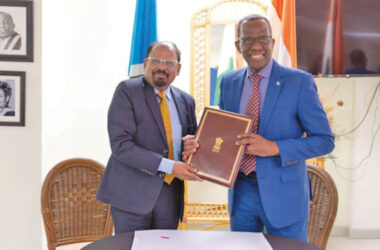
The alarming cost of production of goods and energy is a major concern to the government and people of Saint Lucia.
Minister for Commerce, Manufacturing, Business Development, Cooperatives and Consumer Affairs Emma Hippolyte indicated this much on Wednesday.
In an address to the nation on March 15, (World Consumer Rights Day), Hippolyte stressed on the importance of the United Nations’ Sustainable Development Goals (SDGs), also known as the Global Goals, which were adopted by the United Nations in 2015 as a universal call to action to end poverty, protect the planet and ensure that by 2030 all people enjoy peace and prosperity.
Countries have committed to prioritize progress for those who’re furthest behind.
“Saint Lucians and the world at large are reminded of the need to continue to strive to achieve Sustainable Development Goals Number Seven which is affordable and clean energy, (and) Number Thirteen, climate action… highlighting some of the areas that are impacting consumers positively or negatively whilst calling on consumers, businesses and governments in their tripod relationship to introduce measures that will facilitate the achievement of the above,” Hippolyte said.
“The Russia/Ukraine crisis, global supply chain disruptions and the Covid-19 pandemic have contributed to price volatility, significantly increasing energy costs and uncertainty of supplies of goods and household commodities. It is therefore imperative that Saint Lucia transitions its energy sector to a more sustainable path,” she added.
Speaking on policy interventions to facilitate clean energy transitions, Hippolyte noted that government recently endorsed Saint Lucia’s National Energy Transition Strategy (NETS) an integrated resource plan which was developed through a consultative and participatory process led by government and LUCELEC with technical assistance from friendly donor agencies and governments.
According to her, “it consists (of) a roadmap for achieving greater renewable energy penetration within our energy mix, while pursuing energy efficiencies with three central principles.”
These central principles are service reliability, “which is achieving lower than historical outage duration and frequency; cost containment: reduce consumer costs and reduce impact of fuel volatility to ensure financial viability of utilities, and thirdly, energy independence: achieve renewable energy targets by reducing reliance on fossil fuels and achieve increased energy diversity.”
NETS results indicate that Saint Lucia should develop energy efficiency through solar, wind and energy storage projects as well as geothermal “if the resource proves to be commercially viable.”
“Work on finalizing the electricity bill is very advanced,” Hippolyte added.
It is anticipated that the bill and supporting regulations will be ready for public consultation within a month or two. This will also be submitted to the Cabinet of Ministers thereafter.
“The electricity bill reflects government’s intent to restructure the institutional framework that governs the electricity sector in order to achieve stability in electricity prices and overall sustainability of the sector,” she said.
A key aspect of the draft legislation “is the provision which allows for the entry of independent power producers on Saint Lucia’s energy market, while clarifying the authority and function of the national utility regulatory commission with regards to regulatory oversight of the electricity sector.”
“I am pleased to report that in 2022 street lighting consumption fell for the third consecutive year to 9.2 million kilowatts, a 9.65 percent decline from 2021. This was due significantly to increased LED bulb replacement. I take this opportunity to encourage consumers to transition to LED bulbs and you will reap similar reductions in electricity consumption and costs,” Hippolyte said.
The minister also highlighted a number of projects undertaken by government.
“Under the NDC’s support facility the government was able to conduct energy audits on 34 government buildings; administrative buildings, medical facilities, sporting facilities and schools were assessed. The assessment provided opportunities for savings through energy efficiency investments and distributed solar PV to displace consumption from the grid,” Hippolyte said.
According to her, the results will be used to structure an investment project with the World Bank to address energy efficiency.
“Under the corporative sector I’m happy to inform that three fisher cooperatives have already commenced transitioning to solar energy. The other five cooperatives ae in the process of meeting the prerequisites to facilitate conversion,” she said.
“Saint Lucia records almost two megawatts of grid tied distributed solar PV systems comprising 197 systems on residential and commercial buildings. This shows an increase in the number of interconnected systems of 13 percent over the past year. This is encouraging but there is still scope for more consumers to make that switch and my government will work tirelessly to facilitate this transition,” Hippolyte added.














